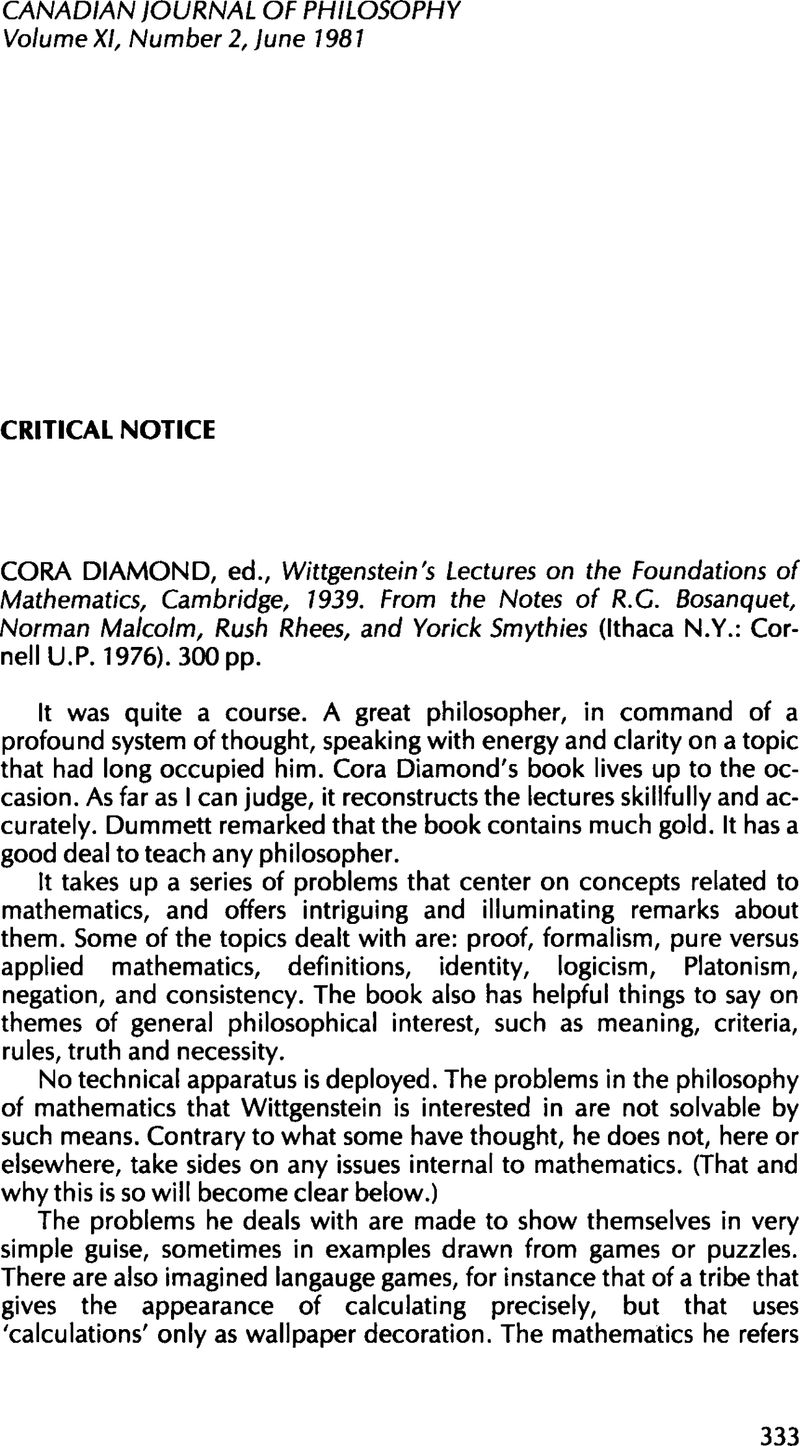Published online by Cambridge University Press: 01 January 2020

1 Dummett, Michael ‘Wittgenstein's Philosophy of Mathematics’ reprinted in Pitcher, G. ed., Wittgenstein (New York: Doubleday 1966) 420–447).CrossRefGoogle Scholar
2 Frege, Gottlob The Foundations of Arithmetic, trans. Austin, J.L. (Oxford: Blackwells 1959) 20e, 21e.Google Scholar
3 Pap, Arthur Semantics and Necessary Truth (New Haven: Yale U.P. 1958).Google Scholar
4 Chihara, Charles S. ‘Wittgenstein's Analysis of the Paradoxes in His Lectures on the Foundations of Mathematics’ Philosophical Review 86 (1977) 365–381.CrossRefGoogle Scholar
5 Here someone may raise the strange objection that, after all, Wittgenstein's claims, as I have interpreted them, are quite humdrum and unexciting. If someone says that gold is free at the local bank, that might be interesting, but if it turns out that in his ‘language game’ gold is defined as ‘air’ then what he says is stupid and humdrum. Similarly, it may be felt, all that occurs in the puzzling cases Wittgenstein wrote about is that the people who deviate from our practice, for example about the proper result of adding two, have adopted a special way of speaking, which mirrors ours in outward form but which obeys different rules. They seem to contradict and surprise us, but if we understand them properly, they do not, anymore than we would be contradicted in our claim that gold is not free at the bank by the above odd speaker. Just as he's Just adopted a silly way of talking about air, the ‘1004, 1008 …’ person has adopted a strange system for using the sign ‘+2’ ., and the people who say that the position in the diagram is checkmate simply have a different game than we do, and are not talking about our checkmate.
The premises of this objection, I think, are more or less correct. We are dealing, according to Wittgenstein, with alternative systems for using signs. But this fact does not make Wittgenstein's position humdrum or uninteresting. I think what lies behind this charge is the following inference: The ‘gold is free' person's claims and the deviant claim about +2, and the like, are humdrum and uninteresting when correctly understood; therefore so are Wittgenstein's claims about mathematics. This non sequitur confuses the nature of the claims made, in mathematics, or the theory of chess, and so on, with Wittgenstein's views of the nature of those claims. If the claims are implicit stipulations, then, one may want to say, they are humdrum. After all, they can hardly be false, if stipulated, and, since they are true in their own system, they do not really contradict seemingly conflicting statements that belong to another system. But it is hardly humdrum or uncontroversial to say that the statements are implicit stipulations, and have those features.
6 Barry Stroud, ‘Wittgenstein and Logical Necessity’, reprinted in Pitcher, op. cit. 447-496.
7 Philosophical Grammar, ed. Rhees, R. trans. by Kenny, A. (Oxford: Blackwells 1974) 476, 477.Google Scholar
8 “Wittgenstein on Mathematics” Encounter (March, 1978) 63-68.